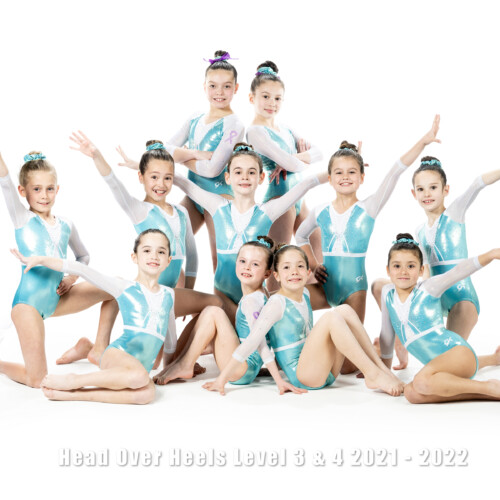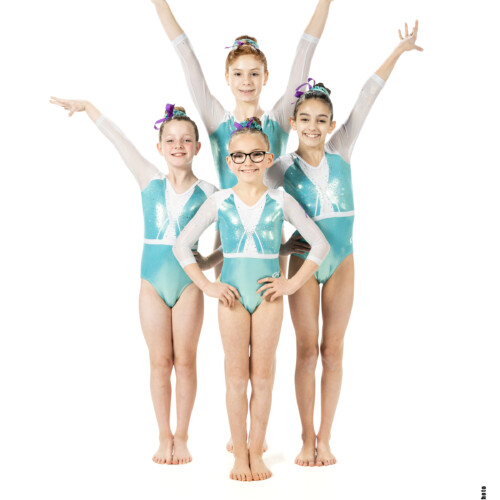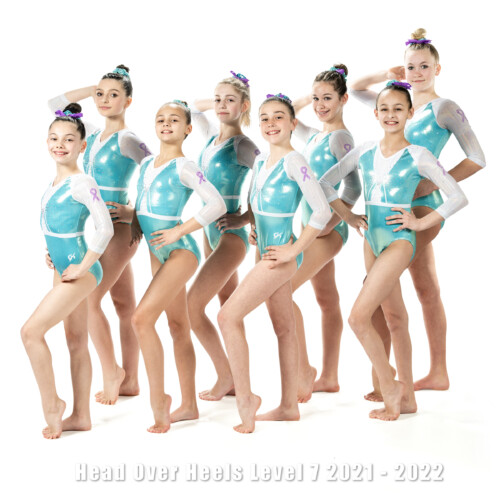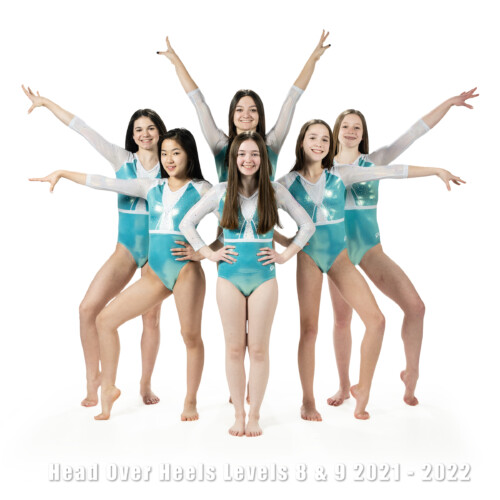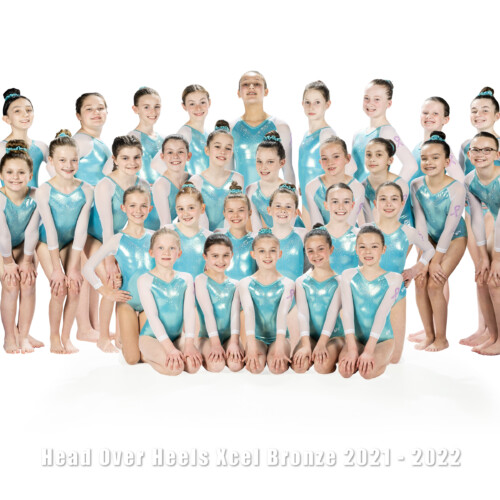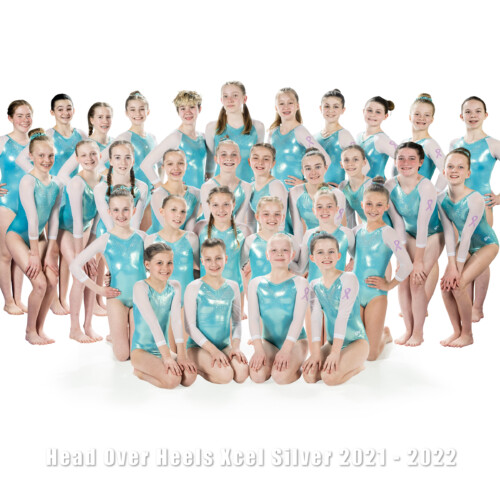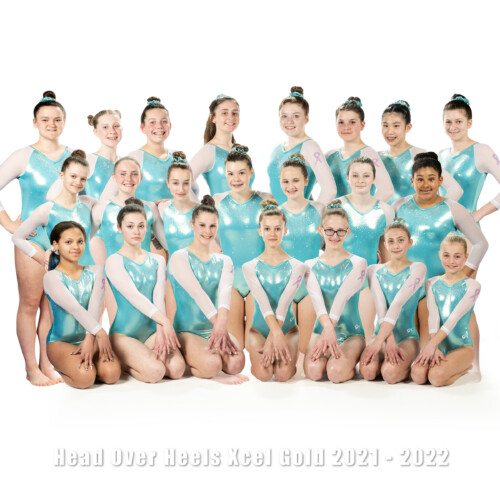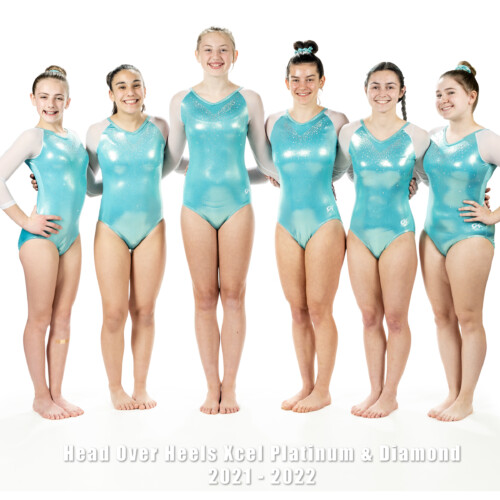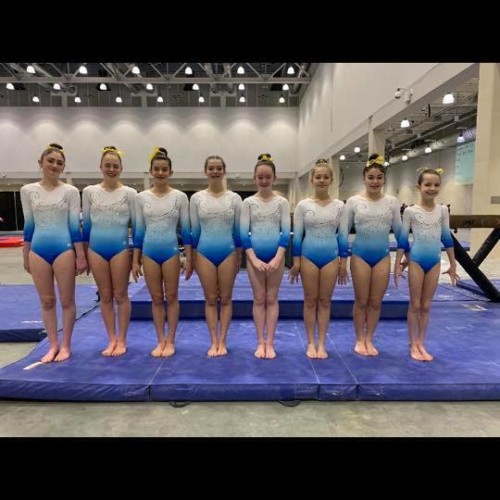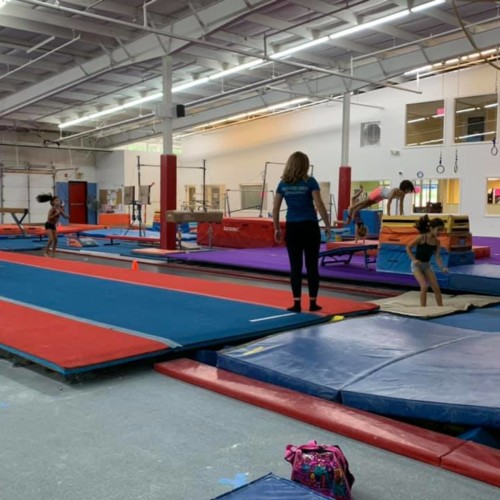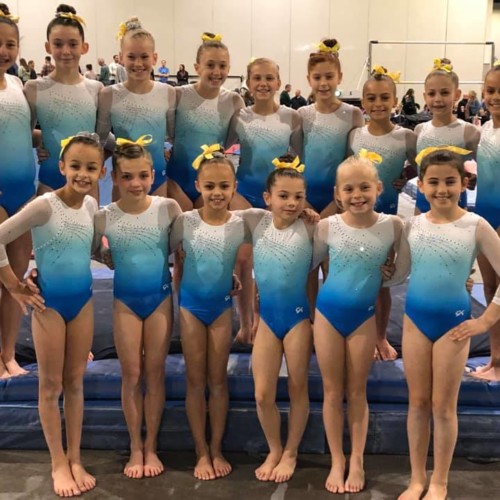
Teams
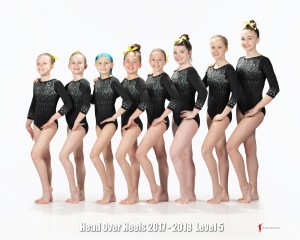
Both recreational and competitive gymnastics programs promote strength, flexibility, endurance, confidence, fitness and
fun. While recreational (non-competitive) programs are fitting for anyone, competitive programs usually require an invitation to join after being evaluated by a qualified coach.
What Do Coaches Look For When Inviting Kids To Team?
When considering a child for a team program, coaches look for the following traits:
- Physical Strength – Can the child easily perform strength exercises such as pull-ups, leg lifts, sprinting, push-ups, sit-ups, and hollow body holds?
- Flexibility – Is the child’s body flexible enough to handle some of the requirements of gymnastics? Can his/her flexibility be improved over time?
- Basic Skills – How are the child’s gymnastics fundamentals? Has the child spent enough time in a class or pre-team program to master the basics? Can the child perform the basics properly? Does the child know proper gymnastics terminology?
- Motivation – Does the child want to learn and succeed, or is he/she content right where she is?
- Coachability – Does the child listen to corrections and try to apply them? Is the child willing to take a few steps back to fix old skills before learning new skills?
- Mental Toughness – How sensitive is the child? Does he or she respond well to criticism? Would the child be able to perform in front of a judge and receive a performance-based score with no more than a healthy amount of anxiety?
- Sportsmanship – Would this child fit in with existing team members? Would he or she encourage the other athletes? Would this child accept both success and defeat respectfully and graciously?
Do Team Gymnasts Receive Better Training?
No. Team gymnasts do not receive better training than class gymnasts, but the majority of the time, they do receive MORE training. Most team gymnasts are required to train a minimum of 4 hours a week, while class students often only come 1 or 2 hours a week. The extra training time allows team coaches to focus on extra conditioning and the smallest of details in every gymnastics skill.
Do Team Gymnasts Learn Bigger, Better Skills Than Recreational Class Gymnasts?
No. Both recreational and competitive gymnasts follow the same curriculum and skill progression set forth by USA Gymnastics. Team gymnasts who have learned impressively difficult skills have done so after committing themselves to a gymnastics team program for several years and putting in countless hours of training time. All class students have the opportunity to learn the same skills as gymnasts on our teams, but must do so while following the proper skill progression. With any gymnast, safety is always the number one priority. Class coaches take into consideration a child’s strength, flexibility, and mental readiness before beginning to teach a new, more difficult skill.
Do Team Gymnasts Progress Through The Levels Faster?
No. In fact, many team gymnasts who are well-trained, strong, and appear to have all of their skills will often repeat a level in order to improve their fundamentals before moving on to the next level. USA Gymnastics provides a set of requirements for each competitive level. Many gymnasts compete successfully for an entire season while missing just one small requirement. It is very common to see a competitive athlete repeat more than one level in order to meet every requirement and achieve a great amount of success. Class students have a bit more flexibility in this matter; class coaches will often forgive a certain skill or two a child may struggle with and promote her to the next level in order to maximize her potential in a smaller amount of time.
What Is Required of Team Gymnasts?
- Commitment – Gymnastics is a sport that requires a team member’s presence for every minute of scheduled training time. Team members are expected to attend all practices, competitions, fundraisers, and other team events. Team members are expected to arrive on time and prepared to train (hair up, gymnastics attire on, water bottle in hand, etc.). While being on a gymnastics team is fun, it is not a social hour and is not something you show up for when you have nothing else to do… If a child is not willing to commit to the requirements of their team, it is best to consider other options, such as the class program, camps, or private lessons.
- Proper Health & Nutrition – An athlete cannot train or perform to the best of their abilities without proper nutrition. All team athletes are expected to eat a well-balanced diet and stay hydrated in order to keep their bodies in the best physical shape possible.
- Attitude – Team gymnasts are expected to have a good attitude towards themselves, their teammates and their coaches. They need to accept criticism in order to improve, and they need to encourage their teammates to be the best they can be.
- Family Commitment – Gymnastics requires a strong family commitment, in the form of transportation, financial assistance, nutritional advice, fundraising, support at competitions, and mental support throughout training. Busy families are encouraged to share contact info to arrange carpools, child-care, etc. to ensure their gymnast is able to be where he or she needs to be at the right time.
- Finances – It’s the part no one wants to think about, but we want to be honest with you. Being on a gymnastics team can be expensive. On top of monthly tuition, you need to consider the price of uniforms, choreographers, competition entry fees, coaches fees, and travel fees.
- the Fundraising – Many gyms will arrange fundraising events to help ease the financial burden of being on a team. These events may take the form of hosting a meet, selling candy bars, canning outside a store, holding a raffle, etc.
Many team gymnasts have already decided that gymnastics will be their life. They want to train through elementary and junior high school. They want to compete in high school and college. Because of their years of commitment and dedication, and more than anything else, the amount of hours they spend training, they generally tend to rise to higher levels and learn harder skills. Many class gymnasts are not as committed, and maybe only want to take gymnastics once or twice a week for a year or two. They may want to play other sports, and dance, and act, and sing, and travel… That’s OK! Gymnastics can be fun for anyone, regardless of their natural talent or level of commitment. No matter what level, our class and team programs are designed to provide each and every child with a unique experience that is both fun and rewarding!
Junior Olympic
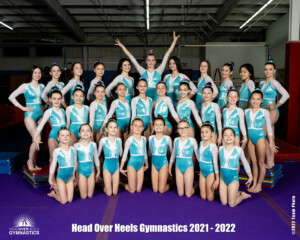 The Head Over Heels Junior Olympic (levels 3-10) team is committed to high standards and strives for excellence in all aspects of gymnastics training. Our goal is for HOH gymnasts to be successful in and out of the gym, and to apply their learned self-discipline in both the gym and all areas in their lives. The compulsory levels (levels 3-5) train from 10 to 12 hours per week and the optional team (levels 6-10) train from 15 – 20 hours per week. This team requires a strong family commitment and the gymnasts have from 6 to 10 competitions per year. We also offer an excellent pre-team program.
The Head Over Heels Junior Olympic (levels 3-10) team is committed to high standards and strives for excellence in all aspects of gymnastics training. Our goal is for HOH gymnasts to be successful in and out of the gym, and to apply their learned self-discipline in both the gym and all areas in their lives. The compulsory levels (levels 3-5) train from 10 to 12 hours per week and the optional team (levels 6-10) train from 15 – 20 hours per week. This team requires a strong family commitment and the gymnasts have from 6 to 10 competitions per year. We also offer an excellent pre-team program.
Xcel
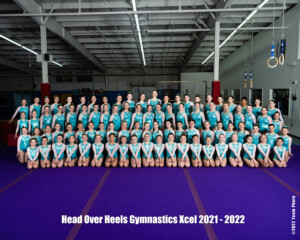 The Xcel (formerly Prep-Optional) program is designed to attract and retain a diverse group of athletes who want to compete but want an alternative to the traditional Junior Olympic level system (1-10.) There are five levels of Xcel: Bronze, Silver, Gold, Platinum, and Diamond. Our Xcel teams work out two to three times a week for a total of 4 – 8 hours per week. Athletes in this program participate in gymnastics competitions throughout the state and have the opportunity to advance to the state and regional championships held at the end of each season.
The Xcel (formerly Prep-Optional) program is designed to attract and retain a diverse group of athletes who want to compete but want an alternative to the traditional Junior Olympic level system (1-10.) There are five levels of Xcel: Bronze, Silver, Gold, Platinum, and Diamond. Our Xcel teams work out two to three times a week for a total of 4 – 8 hours per week. Athletes in this program participate in gymnastics competitions throughout the state and have the opportunity to advance to the state and regional championships held at the end of each season.
This is the ideal team program for athletes who would also like to participate in other sports, as the time commitment is not as demanding as the Junior Olympic program.
Pre-team
Our pre-team program practices 2 days a week for 90 minutes. Pre-team gymnasts focus on strength, flexibility, form, and the basic gymnastics skills needed to have a successful future on a competitive gymnastics team.
Pre-team gymnasts are selected from the class program by our instructors and will be coached by experienced team coaches. Parents will be updated as needed on progress, concerns, and which program would be the best fit for their child following their year(s) on the pre-team.

